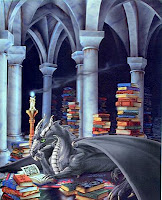Unlike the clever mantra told to children to get them to eat their fruits and veggies, writers are not a product of their nutritional intake. Instead, we are an amalgamation of visual and aural stimuli. We collect these inputs like hoarders, stuffing our minds to the rafters with scenes, characters, stories, dialogues, and anything else we can find. Then we mix everything together into a slurry of deliciousness and spew the whole mess onto the page for our readers to…enjoy? Somewhere this analogy went terribly awry. Oh well. Onwards!
Visual Influences
Movies and television shows definitely impact my writing style. I often think very hard about the scenes in my stories and specifically try to address how they would translate to television or the big screen. Usually, though not always, I try to rewrite passages that would prove difficult to film. My reasoning is that anything that won’t translate to a visual medium means I’m doing too much telling, and not enough showing in my writing.
That said, I still like leaving a lot of room for my reader’s imagination, so I tend to focus on television shows and movies where the actors and directors apply a subtle approach. I pay attention to conversations with lots of unspoken dialogue that’s communicated instead through body language and subtle nuanced behavior.
Some examples of media that has specifically impacted me would be movies like Ocean’s Eleven and Inception, as well as the television series Battlestar Galactica. In Ocean’s Eleven, many of the dialogue scenes are starkly brief and snappy. Characters speak to one another in clipped phrases, leaving the audience to figure out the undercurrent of the conversation. In Inception, each character displays a clear archetype in the story, and each set piece is incredibly distinct and necessary to the story. Again, conversations are kept short and to the point, and plenty of room is left for the viewer to interpret events as they see fit.
My favorite aspect of Battlestar Galactica was the complicated yet believable romantic dilemmas many of the characters faced. In particular, the love triangle of Starbuck, Apollo, and Anders. Starbuck, who was once engaged to Apollo’s brother, has an on-again, off-again affair with her almost-brother-in-law. She’s torn between her love for Anders and her irresistible physical and emotional attraction to Apollo. Self-loathing and bitterness cause each of the three characters to constantly try to extinguish and then rekindle the bonds that bind them together, and the resulting emotional orbits are incredibly rewarding to watch. Again, I’m drawn by the subtle way some of these scenes played out. The things that weren’t said, or weren’t shown on screen, were just as interesting as the things we got to watch on-screen.
When I’m watching a movie or show that I like while I’m writing, I pay particular attention to certain details. I try to pay attention to different conversation styles, and the dynamics that arise between characters. I like to think about why something works in the visual media, and how it would translate (or not translate) to written media.
Aural influences
Music also plays a vital role in my writing process, but it’s not quite as direct as the visual. I use music primarily as background noise to drown out the real world and let me submerge myself into my writing. When I’m working, the music I listen to is almost always instrumental and low-key. That said, I will choose certain musical styles to inform certain scenes. Sometimes I want light, classical music to influence my tone, while other times I need dark, complex melodies to color my writing. Recently, I’ve listened to modern music from Hans Zimmer, Jonny Greenwood, Christopher O’Riley, and Philip Glass, as well as the classics like Bach, Beethoven, Bartok, and Grieg.
When I’m not writing, but I’m in the midst of the writing process, I tend to listen to music with lots of interesting, poetic lyrics, or weird, mind-bending melodies. Bjork, Radiohead, Cocorosie, The Cure, and Peter Gabriel come to mind, but there are plenty of others. What I’m seeking is music that captures simplistic themes using sparse, beautiful phrases in both tone and vocabulary. My hope is that when I return to writing, the poetry of the music will act like a mild seasoning for my own writing, giving it a slightly higher level of artistic writing without drowning the reader in flowery prose.
Sundry Influences
What else influences me during writing? Let’s see: lots of sugar, lots of caffeine, and lots of not-sleep. I’m a sprinter, so my writing efforts are always bursts of creativity spurred by the frantic pace of NaNoWriMo or some other artificial deadline drawn in the sand. I envy folks that write methodically and regularly, but I don’t see that in my future.
Last, but far from least, is the writing of my fellow writers. During November, nothing gets me more excited to write than seeing the most recent passages being crafted by my fellow authors. Every year I feel humbled, and challenged, and inspired by the incredible creativity of the small group of writers I’ve come to know and love in my local community and on the internet. They play an absolutely critical role in motivating me and inspiring my writing.




